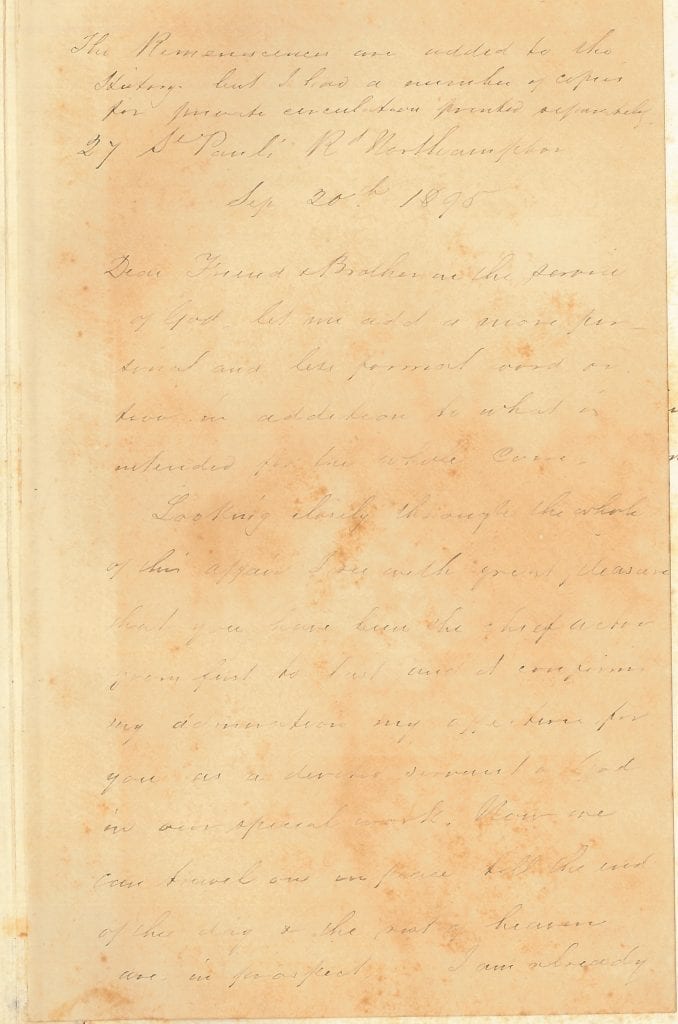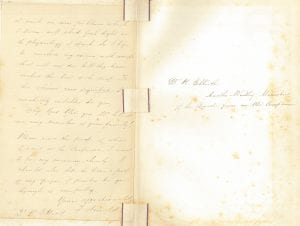“That he was a strong advocate of the oral method goes without saying” – Thomas Arnold 1816-97
By H Dominic W Stiles, on 9 June 2017
 Thomas Arnold, (1816-1897) was a Teacher of the deaf and Nonconformist minister. He was a pioneer in Britain of the oral education of deaf pupils. His family originated in Cheshire but were granted land in West Cavan, Ireland, for supporting King William III. Arnold’s Great Grandmother became a Moravian Protestant, joining one of their settlements. His mother was also part of a Moravian community at Gracehill, Ballymena. You can read details of his family in Arnold’s Reminiscences. I do not propose to give a detailed account of Arnold’s career here. There is plenty of amaterial about and by Arnold, and it deserves fuller attention than I can give it here.
Thomas Arnold, (1816-1897) was a Teacher of the deaf and Nonconformist minister. He was a pioneer in Britain of the oral education of deaf pupils. His family originated in Cheshire but were granted land in West Cavan, Ireland, for supporting King William III. Arnold’s Great Grandmother became a Moravian Protestant, joining one of their settlements. His mother was also part of a Moravian community at Gracehill, Ballymena. You can read details of his family in Arnold’s Reminiscences. I do not propose to give a detailed account of Arnold’s career here. There is plenty of amaterial about and by Arnold, and it deserves fuller attention than I can give it here.
He was a studious boy and was taken into the class of the local rector, Rev. George Kirkpatrick, who was prepared to pay for his university education. Arnold’s father however wanted him to stay working with him as a carpenter and cabinet maker, which he did, until his brother took over that role. Thomas became master of the Moravian school at Gracehill. In his memoir he tells how Kirkpatrick was a subscriber to the Claremont Institution, and had sent boys to that school. A boy who was leaving , James Beatty, who had been manually taught (that is with sign language), was taken on as an apprentice by Thomas’s brother, and Thomas says his interest in deaf education was then roused (Reminiscences, p.22).
I speedily learned the finger alphabet and his mimic gestures. He resorted to few arbitrary or artificial signs in conversation, and his vocabulary was very limited, so that he often found himself at a loss to express his thoughts.
I wonder whether James Beatty had come to learning sign language when he was older, so was perhaps less adept at it? It seems to me that this first contact’ with a Deaf person may have shaped Arnold’s attitude to deaf education – it would make an interesting article to examine Arnold’s educational writing and to follow his intellectual journey.
Arnold eventually moved to Manchester joining the Manchester City Mission that worked among the factory workers, but he felt that he was better fitted to other work and he obtained a position as an assistant teacher inder Charles Baker at Doncaster (ibid p.30). Unfortunately for Arnold, his turning towards nonconformism meant that he was then turned down for several positions as headmaster. He left Doncaster, trained at a Congregational college in Rotherham, and around that time married a Quaker lady, Miss Simpson, in Chorlton in 1848 (Farrar, 1897, p.299). They moved to New South Wales for fifteen months, but he returned due to a “spinal affection, developed by a too stimulating climate” (ibid). Arriving in England via the Holy Land, they settled at Doddridge Chapel, Northamptonshire. It was there that he began teaching with an oral method, his most famous pupil being Abraham Farrar.
Below is a letter of his, stuck into the front of the Reminiscences with stamp gutters, in the copy owned by Richard Elliott of the Margate School, to whom it is dedicated. It reads,
The Remeniscences [sic] can be added to the History but I had a number of copies for private circulation printed separately.
27 Park Rd Northampton
Sep 20th 1895Dear Friend and brother in the service of God, let me add a more personal and less formal word or two in addition to what is intended for the whole c[ure? or cause?].
Looknig [sic] closely through the whole of this affair I see with great pleasure that you have been the chief actor from first to last and it confirms my admiration my affection for you as a devout servant of God in our special work. Now we can travel on in peace till the end of the day and the rest of heaven are in prospect. I am already
p.2
at work on some problems which I know will shed fresh light on the physiology of speech. So I hope to conclude my service with words that will not do till they have reached the last of the deaf. For this otium cum dignitate I am deeply indebted to you.
May God bless you Mr. Elliott and every member of your family!
Please send the proofs of what I said at the conference, I want to put my meaning clearly. I should also like to have a proof of my paper, if printed to go through carefully.
Yours affectionately
T. Arnold
In his obituary, Farrar says of Arnold,
That he was a strong advocate of the oral method goes without saying, but he did not go so far as some, for he recognised that the natural signs used by the deaf cannot be wholly dispensed with at the initial stage. The manual method he did not condemn as such, but held it to be inferior to the oral in educational efficiency. On the other hand, the combined method had no more uncompromising opponent. That many of the views embodied in his works should not command universal assent is only to be expected, but it is unquestionable that both by his example and writings and his freedom from sordid motives, Mr. arnold has done much to raise the standard of teaching, and in consequence to elevate the deaf as a class. (Farrar, 1897, p.303)
He died on the 21st of January, 1897.

 Brief biography. British Deaf-Mute and Deaf Chronicle, 1895, 4, 107. (photo)
Brief biography. British Deaf-Mute and Deaf Chronicle, 1895, 4, 107. (photo)
Obituary. American Annals of the Deaf, 1897, 42, 124-25; 42(2), frontispiece. (photo)
Obituary. British Deaf Monthly, 1897, 6, 84-87. (photo)
FARRAR, A. Obituary. Quarterly Review of Deaf-Mute Education, 1897, 4, 294-304, 342-46.
FARRAR, A. Thomas Arnold: a biographical sketch. Teacher of the Deaf, 1939, 195-200. (portrait)
Biography. Teacher of the Deaf, 1941, 39, 79-80.
DEACON, M. The church on Castle Hill: the history of the Castle Hill United Reformed Church, Northampton. Park Lane Publishing, 1995. pp. 40-44. (photo)
STEWART, I. The centenary of the death of Thomas Arnold. Deaf History Journal, 1997, 1(1), 30-35.
INCE JONES, F., Thomas Arnold, The Teacher of the Deaf 1941 p.79-80
 Close
Close

